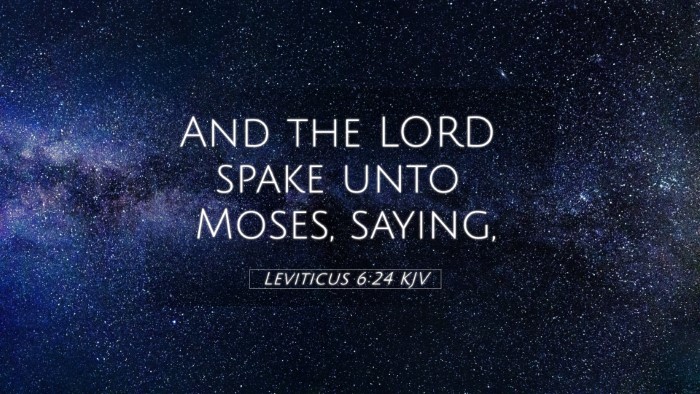Understanding Leviticus 6:24
Leviticus 6:24 states, "And the LORD spake unto Moses, saying, " which marks a divine communication regarding the laws and stipulations for the offerings of the people of Israel. This verse initiates a critical dialogue about the requirements for peace offerings, particularly in their sacrificial practices.
Context and Significance
This verse is situated within a broader context of sacrificial regulations outlined in Leviticus, specifically focusing on the instructions to the priests. The instructions provided highlight the importance of purity and holiness in Israel’s worship practices.
According to Albert Barnes, the commandments conveyed here are reminders of the sanctity of the offerings made to God and the accountability of the priests in maintaining the divine order of worship.
Adam Clarke elaborates on the expectations from the priests and the people, emphasizing that this passage reflects the seriousness of sin and the need for atonement, which was symbolically enacted through sacrifices.
Key Themes
- Divine Instruction: God speaks directly to Moses, reaffirming His authority and the importance of divine revelations in guiding His people.
- Role of the Priests: The priests serve as mediators between God and the Israelites, highlighting the need for proper conduct in sacrificial practices.
- Holiness of Offerings: The emphasis on the sanctity of offerings underscores a broader theme in Leviticus regarding the necessity of purity in worship.
- Atonement and Forgiveness: The sacrificial system is inherently linked to the themes of atonement, forgiveness, and the restoration of relationship between God and His people.
Cross-References to Leviticus 6:24
Understanding Leviticus 6:24 can be enriched through various cross-references that connect key themes of this verse with other parts of the Bible. Consider these references:
- Exodus 29:38-42: Provides directives regarding daily offerings, emphasizing the regularity and importance of sacrifices.
- Leviticus 1:1-3: Introduces the sacrificial system and the distinct types of offerings that demonstrate obedience to God’s commandments.
- Hebrews 9:22: Discusses the necessity of blood for atonement, echoing the sacrifices of the Old Testament in relation to Christ’s ultimate sacrifice.
- Numbers 15:5: Highlights similar themes of offerings and atonement, indicating the continuity of God’s requirements.
- Matthew 5:23-24: Reflects on the significance of reconciling with others before offering gifts at the altar, showing the relational priority God holds in worship.
- Romans 12:1: Encourages living sacrifices, linking Old Testament practices to New Testament Christian conduct.
- Psalm 51:16-17: Reinforces the idea that God desires a contrite heart rather than mere ritualistic offerings, connecting emotional sincerity to sacrificial acts.
Thematic Connections and Interpretations
Leviticus 6:24 invites readers to explore inter-Biblical dialogues that enrich our understanding of worship and atonement. The verse serves as a reminder of the deeper spiritual truths embodied in the rituals of the Old Testament that can be reflected in contemporary faith practices.
Matthew Henry notes that while the specifics of the offerings may differ across dispensations, the underlying theme of repentance and restoration remains a constant call for believers. This continuity provides a unified interpretation of God’s plans across both testaments.
Moreover, by contrasting the Old Testament systems of sacrifices with the New Testament understanding of Christ as the ultimate sacrifice, a comprehensive Bible verse analysis emerges that highlights the evolution of worship from physical offerings to spiritual ones.
Conclusion
Leviticus 6:24 encapsulates essential truths about the nature of God’s relationship with His people, the seriousness of sin, and the need for proper sacrificial worship. Through examining this verse and its connections to other scriptures, believers can gain a deeper understanding of themes of sacrifice, atonement, and divine instruction that resonate throughout the Bible.
Utilizing tools for Bible cross-referencing can greatly aid in discovering these thematic connections, providing a richer context for each verse, such as those found in Bible concordances or cross-reference Bible study guides. By delving into a comparative Bible verse analysis, one can explore how different scriptures relate to each other and uncover profound insights into God’s will and character.


